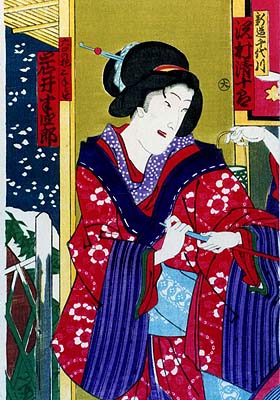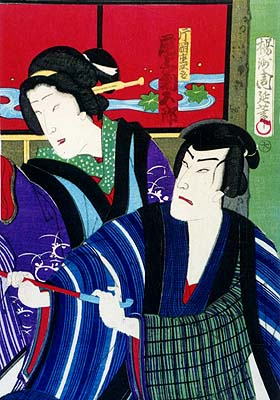| NAOZAMURAI |
| Play title | Kumo ni Magou Ueno no Hatsuhana Yuki no Yűbe Iriya no Azemichi |
|||||||||||||||
| Authors | Kawatake Shinshichi II | |||||||||||||||
| History |
The play "Kumo ni Magou Ueno no Hatsuhana" was staged for the first time in March 1881, in T˘ky˘ at the Shintomiza, and was performed with an amazing casting: Ichikawa Danjűr˘ IX (K˘chiyama), Onoe Kikugor˘ V (Kataoka Naojir˘), Ichikawa Sadanji I (Kaneko Ichinoj˘) and Iwai Hanshir˘ VIII (Michitose) [casting]. The part of "Kumo ni Magou Ueno no Hatsuhana" dealing with Kataoka Naojir˘ and his lover Michitose was staged independently from the rest of the play, under the title "Yuki no Yűbe Iriya no Azemichi", for the first time in April 1910 at the Kabukiza [casting]. It contains one of the most famous Kabuki love scenes, enhanced by a beautiful Kiyomoto accompaniment. |
|||||||||||||||
| Structure |
This part of "Kumo ni Magou Ueno no Hatsuhana" is made up of 3 scenes which are loosely related to the main plot. The second and third scenes are usually performed independently under the title "Yuki no Yűbe Iriya no Azemichi":
The first scene is performed only for the full length performance of "Kumo ni Magou Ueno no Hatsuhana". |
|||||||||||||||
| Key words |
Azemichi Iriya Kak˘shű Kiyomoto Naozamurai Sewamono Sobaya Tenp˘ Rokkasen Yoshiwara |
|||||||||||||||
| Summary |
On an evening in the early spring snow is falling heavily outside a noodle shop. Two men come into the little shop and ask the way to Oguchi Ry˘, a dormitory where a courtesan named Michitose has gone to revive her spirits and regain her health. When they have gone on their way, a man appears, shielding himself from the snow with his umbrella. Naojir˘, an ex-samurai, now bears the ironic nickname Naozamurai (the faithful samurai). As a prominent member of the K˘chiyama Gang, he is the object of a massive manhunt. Thus he cautiously approaches the shop and makes sure that it is empty before entering. While Naojir˘ is drinking, another client comes in, an old blind man. While eating his noodles, old J˘ga explains to the shop owner that he is a masseur on his way to Oguchiro. The well-known courtesan Michitose has fallen ill and, according to rumor, it is because she has been unable to meet her favorite lover. Overhearing the conversation, Naojir˘ decides to see Michitose again before fleeing Edo, writes her a note, follows J˘ga out of the shop, and asks him to deliver it. When J˘ga has gone, Naojir˘ runs into another member of the K˘chiyama Gang, Ushimatsu, who warns him that the police are close on his trail. He had better clear out of Edo while he still has the chance. To himself, Ushimatsu thinks that if he tips off the police agents, allowing them to arrest Naojir˘, he might save his own skin. The two men who came to the noodle shop before are, in fact, police agents on their way to keep a lookout on Michitose's dormitory in hopes of catching her fugitive lover. Ushimatsu's loyalty to the gang struggles for a while with his self-interest. Finally he decides to betray his friend and follows him stealthily. Having received Naojir˘'s letter, Michitose is waiting for him in breathless anticipation. Although he somewhat reluctantly appears, she receives him in great delight. She throws herself sobbing into her lover's arms, asking him reproachfully why he has been away so long. Naojir˘ confesses that he is not the wealthy samurai she supposes him to be, but merely a common criminal. Since he intends to flee Edo, he continues, she had best forget him. Michitose, contrary to his expectations however, confesses that she has always known who he really is. Moreover, she has planned, if he were caught and executed, to take her own life at the same moment, so that they might be reborn together in a future life. Kihei, the dormitory watchman, comes to sympathize with the pair of lovers and suggests that they flee Edo together. But it is already too late. The police burst into the dormitory. Naojir˘ escapes through the garden into the dark night, leaving Michitose wildly calling out his name. From the darkness come his last words, "Mitchi! You are the last girl for me, but I will not see you anymore." This summary has been written by Watanabe Hisao and edited by Jeff Blair [website] |
|||||||||||||||
 |
 |
|
The actors Iwai Hanshir˘ VIII, Sawamura Seijűr˘ II and Onoe Kikugor˘ V playing the roles of Michitose, Chiyogawa and Kataoka Naojir˘ in the "ďguchi Ry˘" scene of the drama "Kumo ni Magou Ueno no Hatsuhana", which was performed in March 1881 in T˘ky˘ at the Shintomiza (print made by Y˘shű Chikanobu) |
|
|
|
| Contact | Main | Top | Updates | Actors | Plays | Playwrights | Programs | Links | FAQ | Glossary | Chronology | Illustrations | Prints | Characters | Derivatives | Theaters | Coming soon | News |